
Somalia: ANNULMENT of Illegal NAVPASS Contract in Violation of PFMA of 2019
|
31 August 2024 12:00
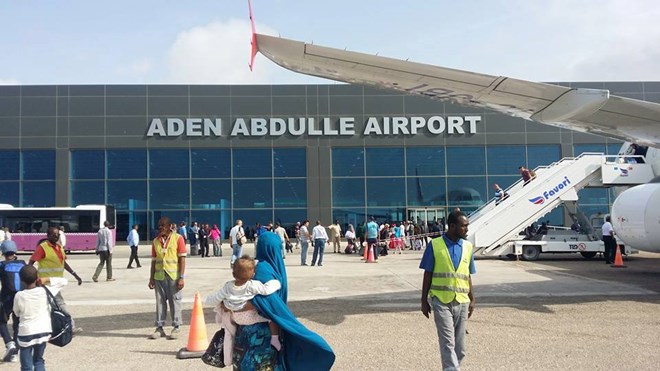
BY - ABDILAHI HASHI ABIB, MP, Somalia Federal Parliament
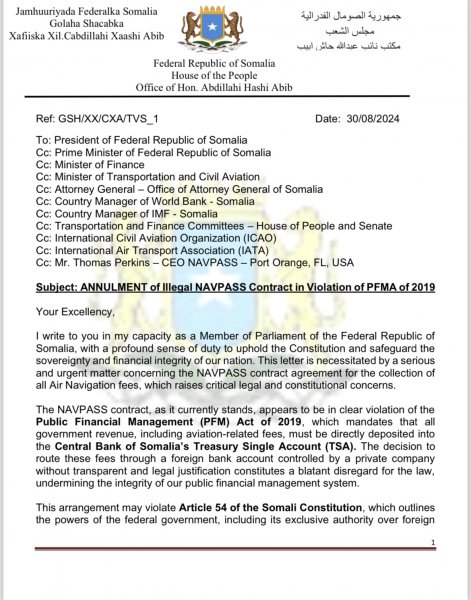
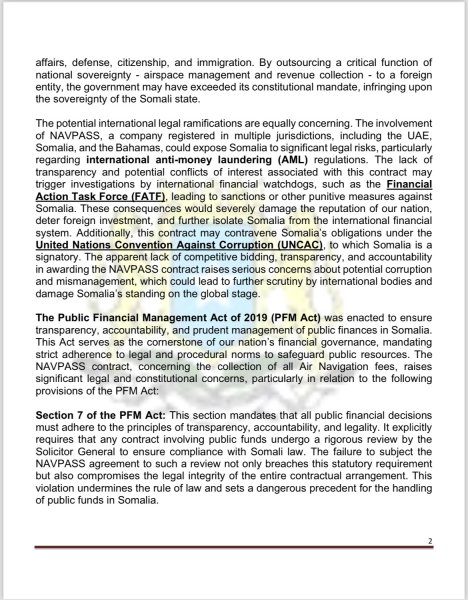
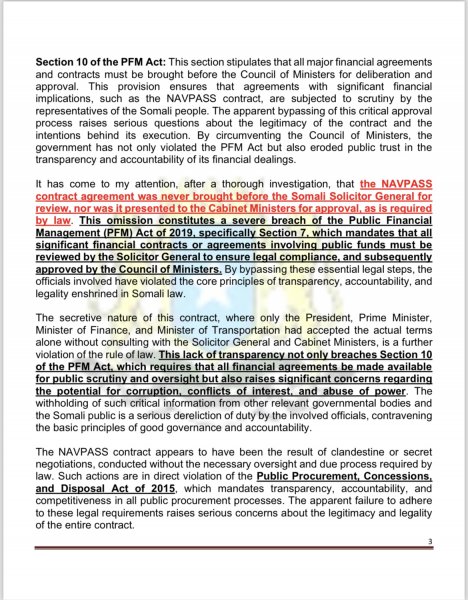

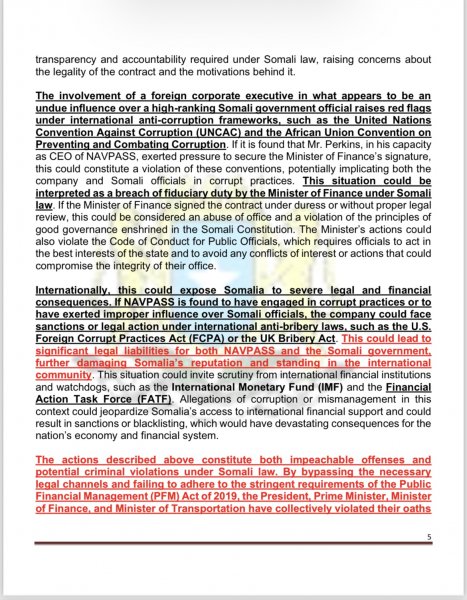
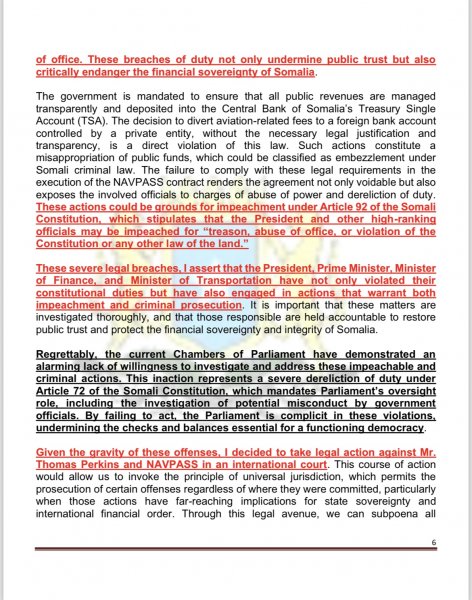
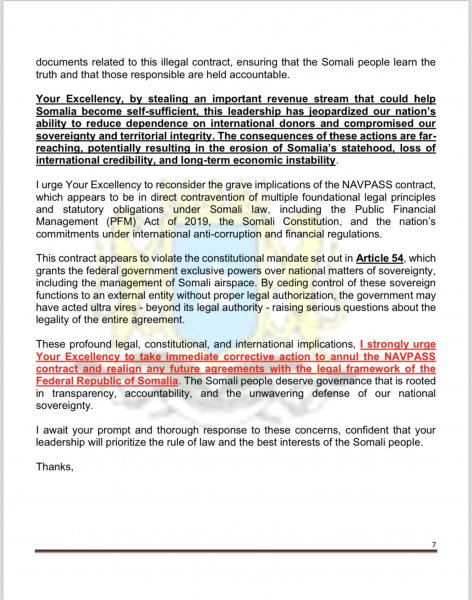
I write to you in my capacity as a Member of Parliament of the Federal Republic of Somalia, with a profound sense of duty to uphold the Constitution and safeguard the sovereignty and financial integrity of our nation. This letter is necessitated by a serious and urgent matter concerning the NAVPASS contract agreement for the collection of all Air Navigation fees, which raises critical legal and constitutional concerns.
The NAVPASS contract, as it currently stands, appears to be in clear violation of the Public Financial Management (PFM) Act of 2019, which mandates that all government revenue, including aviation-related fees, must be directly deposited into the Central Bank of Somalia’s Treasury Single Account (TSA). The decision to route these fees through a foreign bank account controlled by a private company without transparent and legal justification constitutes a blatant disregard for the law, undermining the integrity of our public financial management system.
This arrangement may violate Article 54 of the Somali Constitution, which outlines the powers of the federal government, including its exclusive authority over foreign affairs, defense, citizenship, and immigration. By outsourcing a critical function of national sovereignty - airspace management and revenue collection - to a foreign entity, the government may have exceeded its constitutional mandate, infringing upon the sovereignty of the Somali state.
The potential international legal ramifications are equally concerning. The involvement of NAVPASS, a company registered in multiple jurisdictions, including the UAE, Somalia, and the Bahamas, could expose Somalia to significant legal risks, particularly regarding international anti-money laundering (AML) regulations. The lack of transparency and potential conflicts of interest associated with this contract may trigger investigations by international financial watchdogs, such as the Financial Action Task Force (FATF), leading to sanctions or other punitive measures against Somalia.
These consequences would severely damage the reputation of our nation, deter foreign investment, and further isolate Somalia from the international financial system. Additionally, this contract may contravene Somalia’s obligations under the United Nations Convention Against Corruption (UNCAC), to which Somalia is a signatory. The apparent lack of competitive bidding, transparency, and accountability in awarding the NAVPASS contract raises serious concerns about potential corruption and mismanagement, which could lead to further scrutiny by international bodies and damage Somalia’s standing on the global stage.
The Public Financial Management Act of 2019 (PFM Act) was enacted to ensure transparency, accountability, and prudent management of public finances in Somalia. This Act serves as the cornerstone of our nation’s financial governance, mandating strict adherence to legal and procedural norms to safeguard public resources. The NAVPASS contract, concerning the collection of all Air Navigation fees, raises significant legal and constitutional concerns, particularly in relation to the following provisions of the PFM Act:
Section 7 of the PFM Act: This section mandates that all public financial decisions must adhere to the principles of transparency, accountability, and legality. It explicitly requires that any contract involving public funds undergo a rigorous review by the Solicitor General to ensure compliance with Somali law.
The failure to subject the NAVPASS agreement to such a review not only breaches this statutory requirement but also compromises the legal integrity of the entire contractual arrangement. This violation undermines the rule of law and sets a dangerous precedent for the handling of public funds in Somalia.
Section 10 of the PFM Act: This section stipulates that all major financial agreements and contracts must be brought before the Council of Ministers for deliberation and approval. This provision ensures that agreements with significant financial implications, such as the NAVPASS contract, are subjected to scrutiny by the representatives of the Somali people.
The apparent bypassing of this critical approval process raises serious questions about the legitimacy of the contract and the intentions behind its execution. By circumventing the Council of Ministers, the government has not only violated the PFM Act but also eroded public trust in the transparency and accountability of its financial dealings.
It has come to my attention, after a thorough investigation, that the NAVPASS contract agreement was never brought before the Somali Solicitor General for review, nor was it presented to the Cabinet Ministers for approval, as is required by law.
This omission constitutes a severe breach of the Public Financial Management (PFM) Act of 2019, specifically Section 7, which mandates that all significant financial contracts or agreements involving public funds must be reviewed by the Solicitor General to ensure legal compliance, and subsequently approved by the Council of Ministers. By bypassing these essential legal steps, the officials involved have violated the core principles of transparency, accountability, and legality enshrined in Somali law.
The secretive nature of this contract, where only the President, Prime Minister, Minister of Finance, and Minister of Transportation had accepted the actual terms alone without consulting with the Solicitor General and Cabinet Ministers, is a further violation of the rule of law.
This lack of transparency not only breaches Section 10 of the PFM Act, which requires that all financial agreements be made available for public scrutiny and oversight but also raises significant concerns regarding the potential for corruption, conflicts of interest, and abuse of power. The withholding of such critical information from other relevant governmental bodies and the Somali public is a serious dereliction of duty by the involved officials, contravening the basic principles of good governance and accountability.
The NAVPASS contract appears to have been the result of clandestine or secret negotiations, conducted without the necessary oversight and due process required by law. Such actions are in direct violation of the Public Procurement, Concessions, and Disposal Act of 2015, which mandates transparency, accountability, and competitiveness in all public procurement processes. The apparent failure to adhere to these legal requirements raises serious concerns about the legitimacy and legality of the entire contract.
Reports indicate that the outstanding funds of $38 million, as reported by the International Air Transport Association (IATA), have not been paid to the Somali people by airlines that used the Somalia Airspace. This misappropriation of outstanding of funds constitutes a violation of the Somali Constitution, particularly Article 44, which mandates that public resources must be managed for the benefit of the entire Somali populace. The misallocation or potential misappropriation of these funds could lead to severe legal consequences, including charges of embezzlement and corruption against those involved.
The approval of this contract, reportedly by Your Excellency, in conjunction with the Prime Minister, the Minister of Finance, and the Minister of Transportation, without the necessary cabinet ministers, and legislative approval or oversight, raises serious questions about the violation of the separation of powers enshrined in the Somali Constitution. Article 69(b) of the Constitution requires that any significant financial agreements or contracts involving public resources must be approved by Parliament. The apparent disregard for this constitutional requirement not only undermines the authority of the Parliament but also threatens the very foundation of democratic governance in Somalia.
Internationally, these actions could have far-reaching consequences. The lack of transparency and due process in this contract may trigger investigations by international financial institutions and watchdogs, such as the International Monetary Fund (IMF) and the World Bank, potentially leading to the suspension of financial aid or loans to Somalia. Moreover, the mismanagement of aviation fees, which are crucial to Somalia’s economic stability, could result in sanctions or punitive measures from international aviation bodies, such as the International Civil Aviation Organization (ICAO).
The involvement of Mr Thomas Perkins, CEO of NAVPASS, further complicates this situation. Reports suggest that NAVPASS insisted on the inclusion of the Minister of Finance’s signature as a prerequisite for accepting the contract. This condition raises several serious legal and ethical questions, including potential breaches of both Somali law and international regulations.
This requirement may violate Section 7 and Section 10 of the Public Financial Management (PFM) Act of 2019, which mandate the legal review and approval process for major financial agreements. The insistence on the Minister of Finance’s signature suggests that NAVPASS may have sought to circumvent standard government procurement and contract approval processes, which would ordinarily require the involvement of the Solicitor General and the Council of Ministers.
This potentially undermines the transparency and accountability required under Somali law, raising concerns about the legality of the contract and the motivations behind it.
The involvement of a foreign corporate executive in what appears to be an undue influence over a high-ranking Somali government official raises red flags under international anti-corruption frameworks, such as the United Nations Convention Against Corruption (UNCAC) and the African Union Convention on Preventing and Combating Corruption. If it is found that Mr. Perkins, in his capacity as CEO of NAVPASS, exerted pressure to secure the Minister of Finance’s signature, this could constitute a violation of these conventions, potentially implicating both the company and Somali officials in corrupt practices.
This situation could be interpreted as a breach of fiduciary duty by the Minister of Finance under Somali law. If the Minister of Finance signed the contract under duress or without proper legal review, this could be considered an abuse of office and a violation of the principles of good governance enshrined in the Somali Constitution.
The Minister’s actions could also violate the Code of Conduct for Public Officials, which requires officials to act in the best interests of the state and to avoid any conflicts of interest or actions that could compromise the integrity of their office.
Internationally, this could expose Somalia to severe legal and financial consequences. If NAVPASS is found to have engaged in corrupt practices or to have exerted improper influence over Somali officials, the company could face sanctions or legal action under international anti-bribery laws, such as the U.S. Foreign Corrupt Practices Act (FCPA) or the UK Bribery Act.
This could lead to significant legal liabilities for both NAVPASS and the Somali government, further damaging Somalia’s reputation and standing in the international community. This situation could invite scrutiny from international financial institutions and watchdogs, such as the International Monetary Fund (IMF) and the Financial Action Task Force (FATF). Allegations of corruption or mismanagement in this context could jeopardize Somalia’s access to international financial support and could result in sanctions or blacklisting, which would have devastating consequences for the nation’s economy and financial system.
The actions described above constitute both impeachable offenses and potential criminal violations under Somali law. By bypassing the necessary legal channels and failing to adhere to the stringent requirements of the Public Financial Management (PFM) Act of 2019, the President, Prime Minister, Minister of Finance, and Minister of Transportation have collectively violated their oaths of office. These breaches of duty not only undermine public trust but also critically endanger the financial sovereignty of Somalia.
The government is mandated to ensure that all public revenues are managed transparently and deposited into the Central Bank of Somalia’s Treasury Single Account (TSA). The decision to divert aviation-related fees to a foreign bank account controlled by a private entity, without the necessary legal justification and transparency, is a direct violation of this law. Such actions constitute a misappropriation of public funds, which could be classified as embezzlement under Somali criminal law.
The failure to comply with these legal requirements in the execution of the NAVPASS contract renders the agreement not only voidable but also exposes the involved officials to charges of abuse of power and dereliction of duty. These actions could be grounds for impeachment under Article 92 of the Somali Constitution, which stipulates that the President and other high-ranking officials may be impeached for "treason, abuse of office, or violation of the Constitution or any other law of the land.”
These severe legal breaches, I assert that the President, Prime Minister, Minister of Finance, and Minister of Transportation have not only violated their constitutional duties but have also engaged in actions that warrant both impeachment and criminal prosecution. It is important that these matters are investigated thoroughly, and that those responsible are held accountable to restore public trust and protect the financial sovereignty and integrity of Somalia.
Regrettably, the current Chambers of Parliament have demonstrated an alarming lack of willingness to investigate and address these impeachable and criminal actions. This inaction represents a severe dereliction of duty under Article 72 of the Somali Constitution, which mandates Parliament’s oversight role, including the investigation of potential misconduct by government officials. By failing to act, the Parliament is complicit in these violations, undermining the checks and balances essential for a functioning democracy.
Given the gravity of these offenses, I decided to take legal action against Mr. Thomas Perkins and NAVPASS in an international court. This course of action would allow us to invoke the principle of universal jurisdiction, which permits the prosecution of certain offenses regardless of where they were committed, particularly when those actions have far-reaching implications for state sovereignty and international financial order. Through this legal avenue, we can subpoena all documents related to this illegal contract, ensuring that the Somali people learn the truth and that those responsible are held accountable.
Your Excellency, by stealing an important revenue stream that could help Somalia become self-sufficient, this leadership has jeopardized our nation’s ability to reduce dependence on international donors and compromised our sovereignty and territorial integrity. The consequences of these actions are far-reaching, potentially resulting in the erosion of Somalia’s statehood, loss of international credibility, and long-term economic instability.
I urge Your Excellency to reconsider the grave implications of the NAVPASS contract, which appears to be in direct contravention of multiple foundational legal principles and statutory obligations under Somali law, including the Public Financial Management (PFM) Act of 2019, the Somali Constitution, and the nation’s commitments under international anti-corruption and financial regulations.
This contract appears to violate the constitutional mandate set out in Article 54, which grants the federal government exclusive powers over national matters of sovereignty, including the management of Somali airspace. By ceding control of these sovereign functions to an external entity without proper legal authorization, the government may have acted ultra vires - beyond its legal authority - raising serious questions about the legality of the entire agreement.
These profound legal, constitutional, and international implications, I strongly urge Your Excellency to take immediate corrective action to annul the NAVPASS contract and realign any future agreements with the legal framework of the Federal Republic of Somalia. The Somali people deserve governance that is rooted in transparency, accountability, and the unwavering defense of our national sovereignty.







(Dr. Abdillahi Hashi Abib is a Member of Somalia Federal Parliament)
Leave a comment
- Popular
- Rated
- Commented
04/11/2021 - 11:05:02
28/05/2024 - 15:44:10
02/12/2021 - 11:34:53
01/03/2021 - 09:00:37
Opinions
18/05/2025 - 16:26:37
15/05/2025 - 20:16:04
02/04/2025 - 18:34:53
Politics
17/04/2025 - 01:58:17
13/04/2025 - 10:59:05
Terror Watch
18/05/2025 - 00:37:46
15/05/2025 - 00:59:16
 0
0 




































Somalia: ANNULMENT of Illegal NAVPASS Contract in Violation of PFMA of 2019
BY - ABDILAHI HASHI ABIB, MP, Somalia Federal Parliament